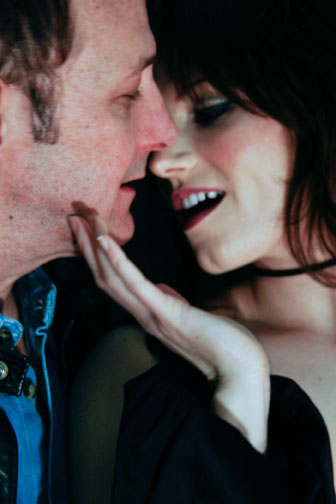Torn Space's Some Explicit Polaroids, and The Beebo Brinker Chronicles at BUA
by Anthony Chase
Some Explicit Polaroids

The Torn Space production of Mark Ravenhill’s Some Explicit Polaroids is very solid and reveals the script to be far more solid than any account I have read lead me to expect. This is a disturbing yet sublime theatrical experience—powerful, unsettling, and thought-provoking. Moreover, such experiences are what one expects from Torn Space.
The production is either naïve to the historical moment at which this play was written, or a clever decision has been made to refocus the emphasis. Either way, the result is a highly effective and provocative evening in the theater.
By the late 1980s, middle-aged former 1960s radicals were aghast to observe an upcoming generation that was, to their perception, politically oblivious. Forgetting that their own political zeal had been fueled by the very real phenomenon of the military draft, they faulted college students of that era for focusing on their studies and career advancement. Simultaneously, of course, it was those very former radicals who became “the me generation.” With a short haircut, the former head of the campus SDS was likely to have translated his organizational skills into a successful career as a stock-broker whose major connection to his hippy past was a preference for organically grown vegetables.
In this production of Some Explicit Polaroids, however, we see a slightly different take. The specificity of the mid-1990s, increasingly remote, seems less important than the universal experience of having one’s attitudes and outlooks change as we age. Ravenhill astutely explores the ways in which we become different people as we get older. At the same time, however, we are inevitably haunted by the thoughts and deeds of our former selves.
Among the most disturbing interchanges is between a woman who expects her former lover, a man who has served a 15-year prison term for past offenses, to continue to be punished in perpetual penance for his past, so that she can advance her career and become increasingly disassociated from her own.
What distinguishes the Torn Space production is a compelling and elegant sense of style. Director David Oliver employs large and looming set pieces that glide through space on casters, shifting our perspectives literally, while a wrap-around video of news and pop-culture surrounds us. Middle-aged bodies are juxtaposed with lithe younger bodies. In addition, let it be said that the production employs a flawless cast.
This production concludes the exploration of British “In-yer-Face” at Torn Space. It has been quite a ride.
Beebo Brinker
The broad strokes of high camp create the illusion that this is a casual and easily deployed style. In fact, camp is a delicate and bewitching brew that can easily be spoiled. Too outrageous and it becomes toxic; too sentimental and it becomes maudlin. As director Tom Dooney once observed to me, there is a vast distance between Charles Busch and Milton Berle. The former suggests to the audience that he truly believes he is one of the grand women he portrays, a Norma Shearer or Joan Fontaine; the latter goofs on such personae as if to ask “Who would ever want to be a woman at all!”
Director Chris Kelly perpetually strikes the balance of camp with unerring perfection. Dating back to his camp productions of Dracula, The Bad Seed, Psycho Beach Party, and Daphne du Maurier’s Rebecca, he understands that place where literature meets pop culture meets the torments of the zeitgeist.
Mr. Kelly has been blessed with the camp gene.
His gift is on full display in the current production of The Beebo Brinker Chronicles at BUA, based on the Ann Bannon’s lesbian pulp novels of the late 1950s and early 1960s. Interestingly, this outing does not employ any drag at all. Here, the women of the company don the wigs and foundations to inspire the identical result. With gentle references to Hollywood melodrama of the 1950s and 1960s, and such high-style television shows as the original Peyton Place, the company evokes a world that is both humorously fictional and hauntingly real.
The pulse of the proceedings can be felt in the fluctuation between giddy hilarity and stunned silence.
A bi-curious housewife walks out on her long-suffering husband with a beleaguered, “Take care of the kids!” Hilarity.
The gay best friend of the leading lady threatens a predatory butch lesbian with the police. Silence.
And then we laugh again.
The result is comic catharsis, every bit as therapeutic as the cleansing and renewal we associate with tragedy. We heal and are revitalized through unbridled laughter. And in this instance, as we laugh at The Beebo Brinker Chronicles, we do not think to ourselves, “Who would want to be a lesbian?” despite the scripts repeated return to that question. Rather, we see ourselves in the women of this play, no matter who we are.
|
Issue Navigation> Issue Index > v9n10 (The Drinking Issue: Thursday, March 11) > Torn Space's Some Explicit Polaroids, and The Beebo Brinker Chronicles at BUA This Week's Issue • Artvoice Daily • Artvoice TV • Events Calendar • Classifieds |









 Current Issue
Current Issue